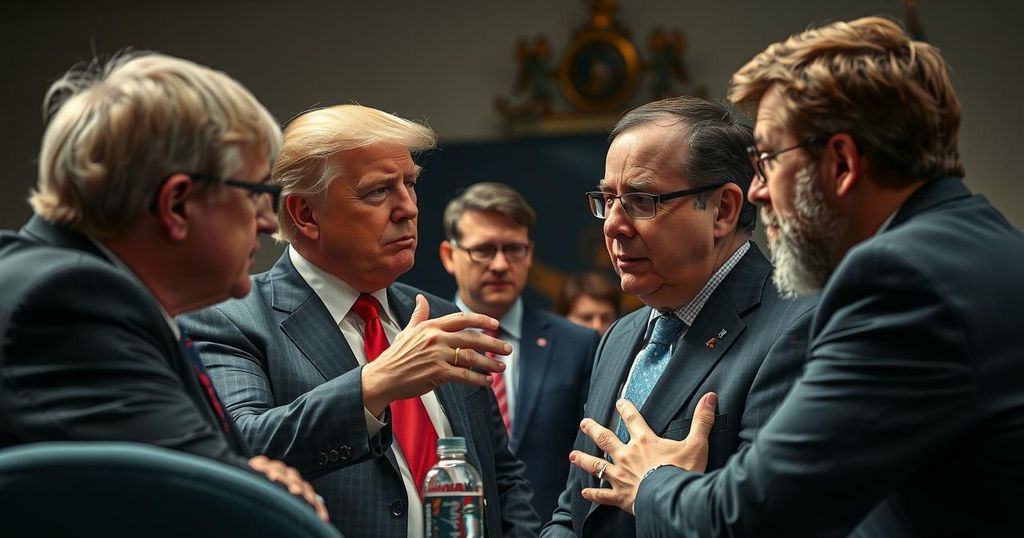World news
AFD, ASIA, BUNDESTAG, CHINA, DEFENSE SPENDING, EUROPE, EUROPE/ASIA, EUROPEAN UNION, FREE DEMOCRATS, FRIEDRICH MERZ, GERMANY, GREEN PARTY, IMMIGRATION POLICY, JO, JÖRG LAU, MEXICO, NORTH AMERICA, POLITICS, POPULISM, PUTIN, REICHSTAG, RUSSIA, SCHOLZ, UKRAINE, VOLKSWAGEN, WORLD WAR II
Elena Martinez
0 Comments
Germany Faces Political and Economic Crises Amid Imminent Elections
Germany is currently facing significant political turmoil, as Chancellor Olaf Scholz’s government has collapsed, prompting early elections amid deep economic and social division. Insults have replaced decorum in parliamentary debates, reflecting an unprecedented strain on German democracy. The rise of extreme political factions further complicates the situation, as traditional parties struggle to unify in the face of mounting criticism and public discontent. Following these developments, the future of Germany and its political landscape hangs in the balance amid pressing uncertainties.
A significant departure from traditional decorum occurred in the Bundestag recently, as Chancellor Olaf Scholz and members of his coalition exchanged fervent insults during a critical vote of confidence. This debate marked the end of Scholz’s coalition government, precipitating early federal elections scheduled for February 23. Unlike past votes which were mostly formalities, the discourse showcased deep divisions and frustrations among politicians amidst a severe economic crisis fueled by high energy costs and poor management decisions. Scholz criticized the Free Democrats for their alleged lack of moral integrity, while opposition leader Friedrich Merz derided Scholz’s government, alleging that it had led the nation into an embarrassing predicament. The incident highlighted an unprecedented strain on German democracy, indicative of broader instability as the country faces increasing challenges, including the rise of extremist parties on both the right and left.
The economic turmoil is palpable, particularly within the automotive industry, where major companies such as Volkswagen are contemplating significant layoffs due to fierce competition from Chinese electric vehicles. German engineering faces a critical challenge that may lead to a historic downturn if these trends continue. The political landscape is equally fraught, with ultra-nationalist parties gaining traction, prompting a backlash against support for Ukraine amidst the ongoing conflict with Russia. In this climate of political unrest, the far-right Alternative for Germany (AfD) and the newly emerged far-left Bündnis Sahra Wagenknecht (BSW) are exploiting public sentiments against globalization and immigration, further destabilizing traditional party politics.
As Germany plunges toward an unexpected snap election, the implications for European stability are profound. With Merkel’s conservative party performing significantly better in polls, the possibility of a coalition government emerges as a necessity, requiring all parties to significantly shift their rhetoric and focus towards finding common ground. Strikingly, as Germany grapples with international pressures and domestic discord, smaller nations such as Poland and the Baltic states are assuming leadership roles in advancing a unified front in European defense strategies. The broader implications of these internal and external pressures extend to the relationship with a potentially re-elected Donald Trump, who has signaled intentions that could drastically alter Germany’s standing on the international stage.
Overall, the forthcoming elections will serve not merely as a referendum on Scholz’s leadership but will fundamentally test the efficacy and resilience of the German political system and its commitment to democracy. The need for a cohesive response to pressing challenges is paramount as the nation prepares for a critical juncture in its political history, highlighting the shortcomings of the status quo and the necessity for substantial reform across both governance and economic management.
Germany is currently experiencing considerable political unrest, characterized by deepening divisions among the major political parties as they confront unprecedented economic challenges. Recent debates in the Bundestag have highlighted this disarray, with leaders resorting to personal attacks amid a diminishing consensus on pivotal national issues. The emergence of extremist parties on both sides of the political spectrum reflects a growing disenchantment among voters, while the looming economic crisis exacerbates the urgency for political accountability and effective governance. The recent collapse of Chancellor Olaf Scholz’s coalition has triggered early elections, further igniting debates about Germany’s role within a shifting European landscape marked by changing alliances and geopolitical tensions, particularly in relation to the ongoing war in Ukraine.
In summary, Germany stands at a critical crossroads as it heads toward early elections amidst turmoil not only within its political class but also within its economy and society at large. The fractious debates dominating parliamentary discussions underscore a dramatic departure from Germany’s historically reserved political discourse. As the country grapples with severe economic challenges and rising extremist sentiments, the upcoming elections will serve as a crucial indicator of public sentiment toward the prevailing political system and its ability to navigate complex challenges at both domestic and international levels. The nation must work collaboratively across party lines to foster a unified approach in addressing its pressing concerns, aiming for a transformative rather than a divisive political landscape moving forward.
Original Source: www.theguardian.com




Post Comment